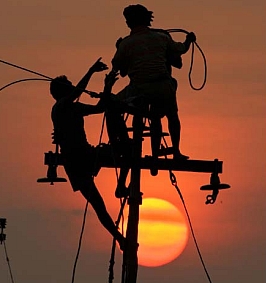A Smart Grid for Nigeria's Energy Woes

 |
| Workers fix a power line Photo courtesy |
As noted previously, Nigeria is struggling to supply domestic electricity demands and that creates problems not just for individuals, but for the businesses, big and small, located in the country. According to the Wall Street Journal, "[b]ig companies like Procter & Gamble Co. and Coca-Cola Co. have resorted to running generators to provide power to 100% of their operations, pushing costs in Nigeria 10% and even 20% higher than in neighboring countries, executives say. Other foreign companies have pulled out of Nigeria, citing high energy costs as one of the primary reasons for doing so." These facts do not even reflect the energy costs spent by small business owners or individuals. Furthermore, according to the government's 2008 estimates, the nation needed $85 billion to revamp its power sector. That amount has undoubtedly gone up since it was announced and continues to do so.
Smartgrids: How they work
So, why isn't Nigeria talking about a smart grid? Smart grids are modern electricity networks that deliver energy to end users via automated digital technology. They are energy efficient, thus reducing cost by billions and increase reliability and transparency. They increase the cooperation and connectivity between various sources and suppliers of energy from hydro-power to thermal, or nuclear to coal. Smart grids are the energy picture of the future and various nations and municipalities have staked their claim on them. The U.S. Department of Energy specified the benefits of smart grids as follows -
* they detect problems and automatically solve them (self heal),
* customers can easily access usage and other information (visibility),
* resists security attacks,
* "provides power quality for 21st century needs",
* "accommodates all generation and storage options",
* encourage innovation and is highly efficient.
Everyone's getting them
IBM is currently building a smart grid for the island nation of Malta for a cost of $90 billion and it will be delivered in record time - 2012. However, parts of the U.S., like Dallas, Texas, and Boulder, Colorado have been using smart grids for many years already. By request of President Obama, the U.S. government is considering creating a national smart grid with its Senate conducting panels and research. Even Nigeria's West African neighbor Ghana has jumped on the smart grid bandwagon. It has hired BPL Africa to update its 11KV Volta River Authority system. The upgrade will expand capacity for amongst other things CCTV security systems, broadband and VOIP technology.
Nigeria needs a samrt grid and it is a possibility
A smart grid in Nigeria will help ensure that the various means of energy generation proposed by or already in existence work together seamlessly to the benefit of businesses and individuals. Currently, Nigeria generates electricity primarily via hydro power and oil, but plans to use coal and liquefied natural gas. It could also employ solar, wind and possibly, thermal energy, and if it revived its now defunct nuclear power program, it could take advantage of that as well for energy purposes. The upfront cost for a national smart grid project would be high, however, the long term benefits would be infinite. The most important benefit would be an electricity grid that provides power to energy starved Nigerians and affords businesses the opportunity to be competitive with their foreign counterparts.
If, however, the federal government is incapable of using 21st century solutions to tackle the nation's electricity issues, specific state governments can be lobbied to consider and create their own statewide smart grids. State governments with proven records of progress such as Cross Rivers or Lagos, can be persuaded via strategic pressure to plan for a statewide smart grid. (The states targeted must be states in which there is evidence that state leadership positions are not gained via rigged elections, in order to ensure that officials will be held accountable by their constituents, and thus work hard to retain their seat.)
In fact, any state with a smart grid would have an incredible competitive edge over all others and that could be used to bring in more foreign direct investment, tourists and other things that will benefit the state's economy and possibly have an exponential effect on other states in the country. Additionally, the intellectual capacity and skills introduced by a smart grid would equally help advance technology, another benefit for any state that would take upon this worthwhile challenge. A state like Lagos, whose 2007 GDP was higher than many African countries would be able to compete with nations like Ghana where businesses have resettled after leaving Nigeria due to high energy costs.
A national smart grid or a collection of state wide smart grids are not beyond the reach of Nigerians. However, the effort needed to have these grids built must come from the people themselves. The benefits to individuals and businesses alike make smart grids a necessity for any country truly invested in preparing their people for the energy needs of the future. A group like Light Up Nigeria or other interest groups in the nation, would do well to advocate this vision of an energy sufficient Nigeria. I, for one, believe that smart grids should be the focus of all future electricity plans for Nigeria.
